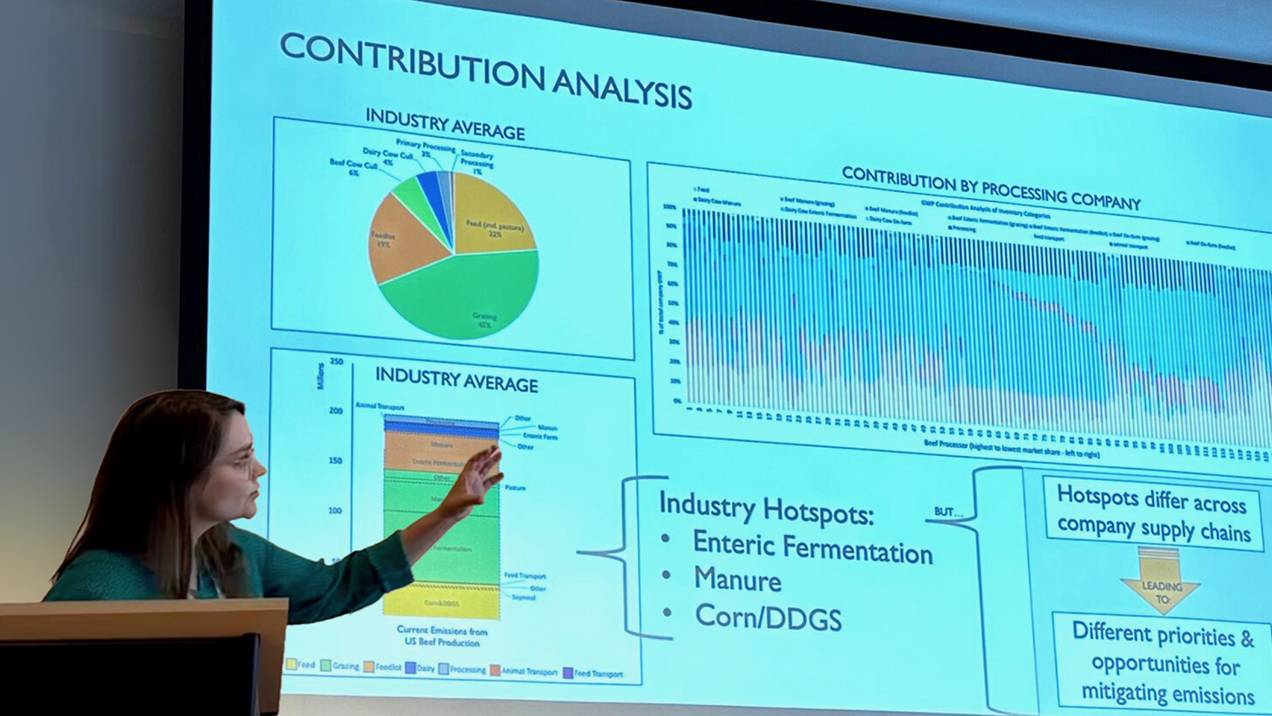
Rylie Pelton presenting FoodS3 research on a spatially-explicit life cycle assessment (LCA) of US beef at the International Society for Industrial Ecology (ISIE) conference in Leiden, NL in 2023.
The Institute on the Environment (IonE) works to discover solutions to the planet’s greatest environmental challenges – but how do these solutions find their way to those who can implement them? One pathway is through LEIF, LLC, a University of Minnesota startup launched in 2016 by IonE research scientist Rylie Pelton, PhD, in response to business leaders asking for help to find scientifically viable ways to better understand and reduce their impacts.
Pelton has long been interested in sustainability as a way to make an impact through her career and first joined IonE in 2011 while pursuing a PhD in Industrial Ecology. Her projects at IonE have focused on food systems and sustainability, with an eye toward identifying how to measure environmental impacts in a more granular way and how to use that information to drive effective action.
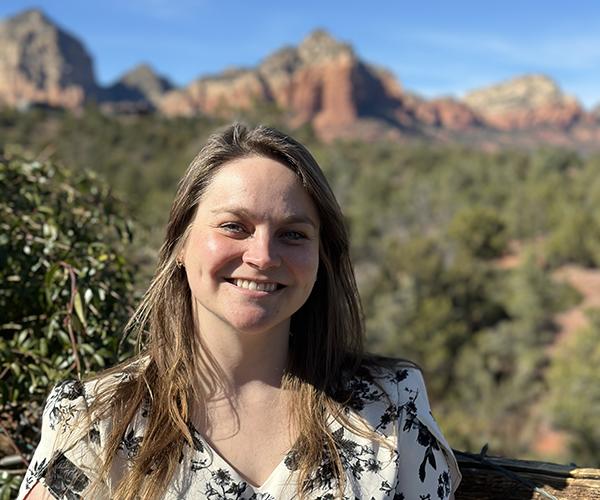
“I am particularly driven by the quest to find more actionable solutions for reducing environmental impacts. My research interests led to innovative advancements and applications of a method called parameterized life cycle assessment (LCA),” said Pelton. “This method can help businesses and communities better achieve their sustainability goals, compared to what can be achieved with traditional LCA approaches.”
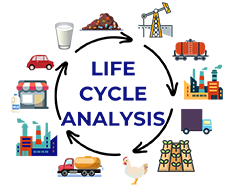
Life cycle assessments are a way of understanding and quantifying environmental impacts at each stage of a product’s life cycle, from extraction of resources, through intermediate processing, production and assembly, transportation, and ultimately disposal, reuse, or recycling of the final product. LCAs can be cradle to grave or, more often in industry, cradle to gate, as many producers are primarily interested in the impacts of production processes and supply chains they can directly influence.
Pelton uses LCA in her work at IonE. For example, FoodS3 (Food System Supply chain Sustainability), one of her long standing IonE projects, focuses on the sustainability of food industry supply chains. The project improves the ability to model unique impacts of crop and animal production and helps identify ways to reduce those impacts. Another project, SRAPS (Sustainable and Resilient Animal Protein Systems), expands on FoodS3 to examine shocks to food systems, along with potential strategies to increase resilience and reduce climate change impacts.
Both of these projects tie into the work Pelton now does at LEIF, where her unique approach to LCA helps companies across industries understand, compare, and reduce impacts. While traditional LCAs use national average impact factors to give generalized impact estimates, Pelton’s parameterized LCA approaches differentiate specific technologies and geographies and account for variation across inputs and outputs of production throughout the lifecycle, providing entity- and region-specific assessments of baseline impacts. “By putting a spotlight on the hotspots across geographic and supply chain stages and simulating alternative production and consumption scenarios, we can identify the key leverage points that companies can target to more effectively and efficiently achieve sustainability goals.”
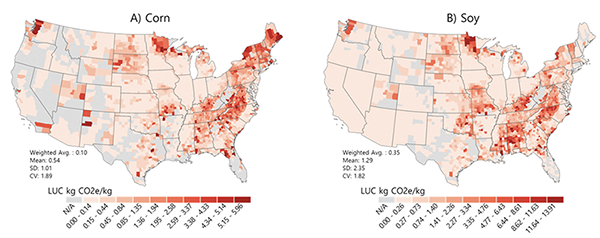
Pelton’s team is currently partnering with Dairy Management Inc. (DMI), which works to increase sales of and demand for US dairy products through research, education, and innovation and to maintain confidence in dairy foods, farms, and businesses. The dairy industry as a whole and through the DMI’s Innovation Center for US Dairy has set aggressive environmental sustainability goals to achieve greenhouse gas neutrality, optimize water usage, and improve water quality by 2050. As part of this pledge the industry wants to better understand the industry’s footprint, identify opportunities to reduce impacts, and is partnering with LEIF to develop the tools necessary to better understand those objectives.
In 2007, the industry completed an LCA of a gallon of milk that established a grass-to-glass baseline. The research confirmed that the industry contributed approximately 2% of total US greenhouse gas emissions. With the new 2050 commitment, the industry requires an updated and detailed LCA to determine its current status, help identify effective strategies to reduce its footprint, and to forecast opportunities for decarbonization. Fabian Bernal, DMI’s vice president of environmental and sustainability measuring and modeling, describes LEIF as a very important partner in DMI’s work toward its net zero commitment.
“Rylie Pelton and LEIF are guiding us in making responsible decisions along the way,” said Bernal. “They are currently helping with the development of a calculator that takes big data systems and information from multiple places, such as the EPA and the USDA, and generates models toward 2050 and the development of a groundbreaking and unique parametric LCA for the dairy industry.”
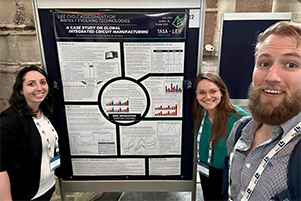
LEIF’s cutting-edge methods and tools for parameterized LCA and scenario analysis provide highly actionable and individualized guidance, whereas other companies in the same space that rely on broad averages provide less actionable information. LEIF is continuing to develop new tools to advance and enhance the capabilities of applied LCA, while growing partnerships and coalitions to promote science-based sustainability efforts across industries.
While juggling the roles of research scientist and chief executive officer can be challenging, it is also rewarding. “It offers a unique opportunity to bridge the gap between academic research and practical application of sustainability,” said Pelton. “Ultimately it helps drive change both within and outside of academia. My work at IonE can lead to research breakthroughs, and my role at LEIF helps me put those breakthroughs into action.”
Pelton’s advice for other researchers interested in starting a company? “Deeply understand the problem you aim to solve, build a strong team that shares your vision, and remain adaptable to the different lessons each challenge can teach you.”
She’s also interested in mentoring the next generation of industrial ecologists: “It’s a field that’s been around since the 1970s but didn’t really take off until 2010. There’s still a lack of folks in the space to help put these methods into action, and we’re hoping LEIF can be a home for people looking to make a difference.”